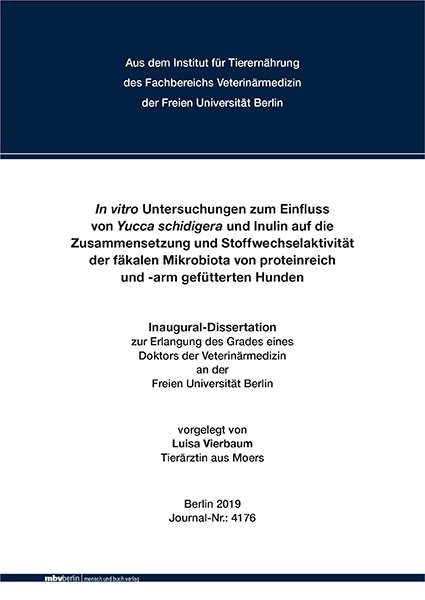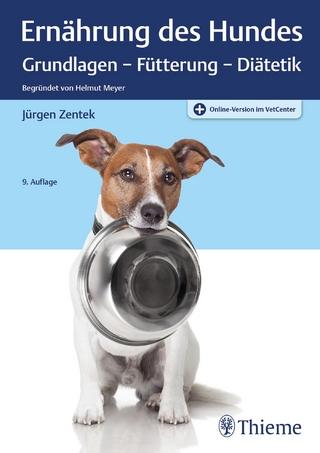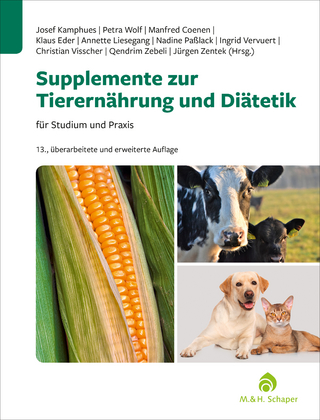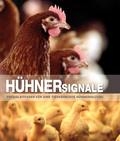
In vitro Untersuchungen zum Einfluss von Yucca schidigera und Inulin auf die Zusammensetzung und Stoffwechselaktivität der fäkalen Mikrobiota von proteinreich und -arm gefütterten Hunden
Seiten
2020
|
1. Aufl.
Mensch & Buch (Verlag)
978-3-96729-031-8 (ISBN)
Mensch & Buch (Verlag)
978-3-96729-031-8 (ISBN)
- Keine Verlagsinformationen verfügbar
- Artikel merken
"In vitro evaluation of the effects of Yucca schidigera and inulin on composition and metabolism of faecal microbiota of high- and low-protein fed dogs"
This in vitro study aimed to evaluate the effects of Yucca schidigera powder (YSP) and inulin (I) on composition of faecal microbiota and its formation of protein fermentation metabolites (short (SCFA) and branched-chain fatty acids (BCFA), phenolic and indolic compounds, biogenic amines, ammonia and pH) by using faecal inocula from dogs fed either a low (A) or a high (B) protein diet (crude protein 201 or 377 g/kg as fed). Nine treatments for each diet were evaluated in an in vitro batch culture system over 24 h: (1) control with no addition of substrate; (2) 2,00 g/l YSP; (3) 4,00 g/l YSP; (4) 2,00 g/l YSP and 1,00 g/l I; (5) 4,00 g/l YSP and 1,00 g/l I; (6) 2,00 g/l YSP and 5,00 g/l I; (7) 4,00 g/l YSP und 5,00 g/l I; (8) 1,00 g/l I; (9) 5,00 g/l I of faecal culture of dogs fed diet A or B. Several changes in fermentation metabolites were analysed. Samples incubated with the faecal inocula of dogs fed diet B produced lower concentrations of total SCFA, acetate, propionate (p ≤ 0.001), i-valerate (p = 0.003), D-lactate (p = 0.041) and indole (p = 0.003), whereas pH (p ≤ 0.001) was increased. Supplementation of I increased the content of putrescine, D- and L-lactate, total SCFA, acetate, propionate, n-butyrate (p ≤ 0.001), while i-valerate, indole and pH (p ≤ 0.001) were reduced. Ammonia was lower (p ≤ 0.001) in samples with faecal inocula from dogs fed diet B and further reduced by the addition of I (p ≤ 0.001). Samples with faecal inocula from dogs fed diet A had a fewer quotient of ammonia and total SCFA (p = 0.003). Supplementation of YSP (p = 0.016), I (p ≤ 0.001), I in combination with diet A (p = 0.006) and YSP in combination with I (p = 0.031) led to a futher reduction of the quotient of ammonia and total SCFA. Total number of copies of all bacterial groups was increased in samples incubated with faecal inoculum from dogs fed diet A, the supplementation of I (p ≤ 0.001) and YSP (p = 0.021). Protein content of the diet as well as supplementation of I and YSP showed numerous positive effects on the abundance of the analysed bacteria.
In conclusion, dietary protein concentration and the in vitro supplementation of I and YSP led to a stimulation of growth and fermentation intensity of the faecal microbiota, whereby YSP appeared to have only minor effects on the formation of protein fermentation metabolites. "In vitro Untersuchungen zum Einfluss von Yucca schidigera und Inulin auf die Zusammensetzung und Stoffwechselaktivität der fäkalen Mikrobiota von proteinreich und -arm gefütterten Hunden"
Die vorliegende in vitro Studie zielte darauf ab, die Auswirkungen von Yucca schidigera Pulver (YSP) und Inulin (I) auf die Zusammensetzung der fäkalen caninen Mikrobiota und deren Bildung von Metaboliten der Proteinfermentation (kurz- (SCFA) und verzweigtkettige Fettsäuren (BCFA), phenolische und indolische Verbindungen, biogene Amine, Ammonium und pH-Wert) unter Verwendung von fäkalem Inokulum von Hunden, die mit einem proteinarmen (A) oder -reichen Futter (B) (201 oder 377 g/kg uS) gefüttert wurden, zu untersuchen. Neun Substratansätze für jede Diät wurden in vitro in einem statischen Kurzzeitinkubationssystem für 24 Stunden inkubiert und anschließend ausgewertet: (1) Kontrolle ohne Zusatz von Substrat; (2) 2,00 g/l YSP; (3) 4,00 g/l YSP; (4) 2,00 g/l YSP und 1,00 g/l I; (5) 4,00 g/l YSP und 1,00 g/l I; (6) 2,00 g/l YSP und 5,00 g/l I; (7) 4,00 g/l YSP und 5,00 g/l I; (8) 1,00 g/l I; (9) 5,00 g/l I in der Fäkalsuspension von Hunden, die mit Futter A oder B gefüttert wurden. Mehrere Veränderungen wurden in der Zusammensetzung der Fermentationsmetaboliten analysiert. Proben, die mit dem fäkalen Inokulum von Hunden inkubiert wurden, die mit Diät B gefüttert wurden, produzierten geringere Konzentrationen von SCFA total, Essig-, Propion- (p ≤ 0,001), i-Valeriansäure (p = 0,003), D-Laktat (p = 0,041) und Indol (p = 0,003), während der pH-Wert (p ≤ 0,001) anstieg. Die Supplementierung von I erhöhte den Gehalt an Putrescin, D- und L-Laktat, SCFA total, Essig-, Propion-, n-Buttersäure (p ≤ 0,001), während i-Valeriansäure, Indol und der pH-Wert (p ≤ 0,001) reduziert wurden. Ammonium war niedriger (p ≤ 0,001) in Proben mit fäkalem Inokulum von Hunden, die mit Diät B gefüttert wurden, und weiter reduziert durch den Zusatz von I (p ≤ 0,001). Proben mit fäkalem Inokulum von Hunden, die mit der Diät A gefüttert wurden, hatten einen geringeren Quotienten von Ammonium und SCFA insgesamt (p = 0,003). Die Ergänzung von YSP (p = 0,016), I (p ≤ 0,001), die Kombination von I und Diät A (p = 0,006) und YSP in Kombination mit I (p = 0,031) führten zu einer weiteren Reduktion des Quotienten von Ammonium und Gesamtkonzentration SCFA. Die Gesamtkopienzahl aller bakteriellen Gruppen war bei Proben, die mit dem fäkalen Inokulum Zusammenfassung von Hunden inkubiert wurden, die mit Diät A gefüttert wurden sowie dem Zusatz von I (p ≤ 0,001) und YSP (p = 0,021), erhöht. Der Proteingehalt der Diät und die Supplementierung von I sowie YSP zeigten zahlreiche positive Effekte auf das Vorkommen der analysierten Bakterien.
Zusammenfassend lässt sich sagen, dass der Proteingehalt der Diät und die in vitro Supplementierung von I und YSP zu einer Stimulation des Wachstums und der Fermentationskinetik der fäkalen Mikrobiota führten, wobei YSP nur geringe Auswirkungen auf die Bildung von Proteinfermentationsmetaboliten zu haben schien.
This in vitro study aimed to evaluate the effects of Yucca schidigera powder (YSP) and inulin (I) on composition of faecal microbiota and its formation of protein fermentation metabolites (short (SCFA) and branched-chain fatty acids (BCFA), phenolic and indolic compounds, biogenic amines, ammonia and pH) by using faecal inocula from dogs fed either a low (A) or a high (B) protein diet (crude protein 201 or 377 g/kg as fed). Nine treatments for each diet were evaluated in an in vitro batch culture system over 24 h: (1) control with no addition of substrate; (2) 2,00 g/l YSP; (3) 4,00 g/l YSP; (4) 2,00 g/l YSP and 1,00 g/l I; (5) 4,00 g/l YSP and 1,00 g/l I; (6) 2,00 g/l YSP and 5,00 g/l I; (7) 4,00 g/l YSP und 5,00 g/l I; (8) 1,00 g/l I; (9) 5,00 g/l I of faecal culture of dogs fed diet A or B. Several changes in fermentation metabolites were analysed. Samples incubated with the faecal inocula of dogs fed diet B produced lower concentrations of total SCFA, acetate, propionate (p ≤ 0.001), i-valerate (p = 0.003), D-lactate (p = 0.041) and indole (p = 0.003), whereas pH (p ≤ 0.001) was increased. Supplementation of I increased the content of putrescine, D- and L-lactate, total SCFA, acetate, propionate, n-butyrate (p ≤ 0.001), while i-valerate, indole and pH (p ≤ 0.001) were reduced. Ammonia was lower (p ≤ 0.001) in samples with faecal inocula from dogs fed diet B and further reduced by the addition of I (p ≤ 0.001). Samples with faecal inocula from dogs fed diet A had a fewer quotient of ammonia and total SCFA (p = 0.003). Supplementation of YSP (p = 0.016), I (p ≤ 0.001), I in combination with diet A (p = 0.006) and YSP in combination with I (p = 0.031) led to a futher reduction of the quotient of ammonia and total SCFA. Total number of copies of all bacterial groups was increased in samples incubated with faecal inoculum from dogs fed diet A, the supplementation of I (p ≤ 0.001) and YSP (p = 0.021). Protein content of the diet as well as supplementation of I and YSP showed numerous positive effects on the abundance of the analysed bacteria.
In conclusion, dietary protein concentration and the in vitro supplementation of I and YSP led to a stimulation of growth and fermentation intensity of the faecal microbiota, whereby YSP appeared to have only minor effects on the formation of protein fermentation metabolites. "In vitro Untersuchungen zum Einfluss von Yucca schidigera und Inulin auf die Zusammensetzung und Stoffwechselaktivität der fäkalen Mikrobiota von proteinreich und -arm gefütterten Hunden"
Die vorliegende in vitro Studie zielte darauf ab, die Auswirkungen von Yucca schidigera Pulver (YSP) und Inulin (I) auf die Zusammensetzung der fäkalen caninen Mikrobiota und deren Bildung von Metaboliten der Proteinfermentation (kurz- (SCFA) und verzweigtkettige Fettsäuren (BCFA), phenolische und indolische Verbindungen, biogene Amine, Ammonium und pH-Wert) unter Verwendung von fäkalem Inokulum von Hunden, die mit einem proteinarmen (A) oder -reichen Futter (B) (201 oder 377 g/kg uS) gefüttert wurden, zu untersuchen. Neun Substratansätze für jede Diät wurden in vitro in einem statischen Kurzzeitinkubationssystem für 24 Stunden inkubiert und anschließend ausgewertet: (1) Kontrolle ohne Zusatz von Substrat; (2) 2,00 g/l YSP; (3) 4,00 g/l YSP; (4) 2,00 g/l YSP und 1,00 g/l I; (5) 4,00 g/l YSP und 1,00 g/l I; (6) 2,00 g/l YSP und 5,00 g/l I; (7) 4,00 g/l YSP und 5,00 g/l I; (8) 1,00 g/l I; (9) 5,00 g/l I in der Fäkalsuspension von Hunden, die mit Futter A oder B gefüttert wurden. Mehrere Veränderungen wurden in der Zusammensetzung der Fermentationsmetaboliten analysiert. Proben, die mit dem fäkalen Inokulum von Hunden inkubiert wurden, die mit Diät B gefüttert wurden, produzierten geringere Konzentrationen von SCFA total, Essig-, Propion- (p ≤ 0,001), i-Valeriansäure (p = 0,003), D-Laktat (p = 0,041) und Indol (p = 0,003), während der pH-Wert (p ≤ 0,001) anstieg. Die Supplementierung von I erhöhte den Gehalt an Putrescin, D- und L-Laktat, SCFA total, Essig-, Propion-, n-Buttersäure (p ≤ 0,001), während i-Valeriansäure, Indol und der pH-Wert (p ≤ 0,001) reduziert wurden. Ammonium war niedriger (p ≤ 0,001) in Proben mit fäkalem Inokulum von Hunden, die mit Diät B gefüttert wurden, und weiter reduziert durch den Zusatz von I (p ≤ 0,001). Proben mit fäkalem Inokulum von Hunden, die mit der Diät A gefüttert wurden, hatten einen geringeren Quotienten von Ammonium und SCFA insgesamt (p = 0,003). Die Ergänzung von YSP (p = 0,016), I (p ≤ 0,001), die Kombination von I und Diät A (p = 0,006) und YSP in Kombination mit I (p = 0,031) führten zu einer weiteren Reduktion des Quotienten von Ammonium und Gesamtkonzentration SCFA. Die Gesamtkopienzahl aller bakteriellen Gruppen war bei Proben, die mit dem fäkalen Inokulum Zusammenfassung von Hunden inkubiert wurden, die mit Diät A gefüttert wurden sowie dem Zusatz von I (p ≤ 0,001) und YSP (p = 0,021), erhöht. Der Proteingehalt der Diät und die Supplementierung von I sowie YSP zeigten zahlreiche positive Effekte auf das Vorkommen der analysierten Bakterien.
Zusammenfassend lässt sich sagen, dass der Proteingehalt der Diät und die in vitro Supplementierung von I und YSP zu einer Stimulation des Wachstums und der Fermentationskinetik der fäkalen Mikrobiota führten, wobei YSP nur geringe Auswirkungen auf die Bildung von Proteinfermentationsmetaboliten zu haben schien.
| Erscheinungsdatum | 29.06.2020 |
|---|---|
| Verlagsort | Berlin |
| Sprache | deutsch |
| Maße | 148 x 210 mm |
| Themenwelt | Veterinärmedizin ► Allgemein ► Tierernährung / Tierhaltung / Tierzucht |
| Veterinärmedizin ► Kleintier | |
| Schlagworte | amines • Animal nutrition • Digestion • dog faeces • dog feeding • Dogs • faeces composition • faeces examination • Feeds • Fermentation • Füttern • Hunde • Hundefütterung • Hundekot • Inulin • Lactic acid • microbial flora • mikrobielle Flora • pH • Polymerase chain reaction • Tierernährung • Verdauung • Yucca Schidigera |
| ISBN-10 | 3-96729-031-X / 396729031X |
| ISBN-13 | 978-3-96729-031-8 / 9783967290318 |
| Zustand | Neuware |
| Informationen gemäß Produktsicherheitsverordnung (GPSR) | |
| Haben Sie eine Frage zum Produkt? |
Mehr entdecken
aus dem Bereich
aus dem Bereich
Grundlagen - Fütterung - Diätetik Begründet von Helmut Meyer
Buch (2022)
Thieme (Verlag)
91,00 €
Praxisleitfaden für eine tiergerechte Hühnerhaltung
Buch | Softcover (2023)
Landwirtschaftsverlag Münster
44,80 €


